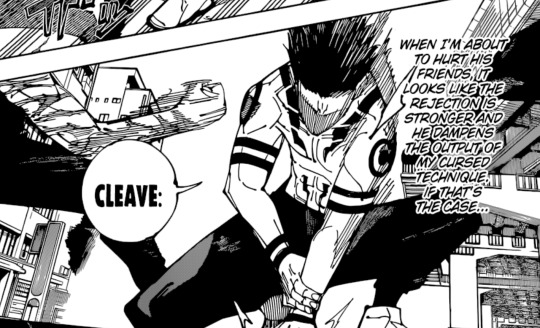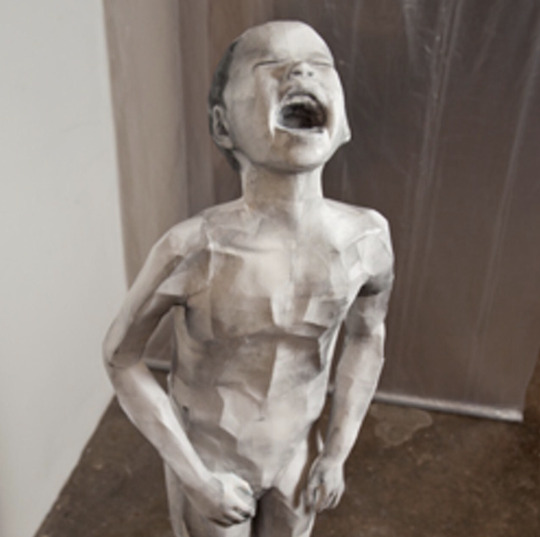#jjk ch 215
Explore tagged Tumblr posts
Note
gege akutami is a menace to society actually
in case you haven't read, I'm talking about 215, so you can ignore me when you're ready
*
*
*
*
he saw us have a little hope last week and had to send us tumbling again 😢
it's going to be a tough ride for sure ~
I honestly don't know how they'll be able to handle sukuna at full form bc even with the limitations, he was still countering. It'd be even worse if he's willing to work with kenjaku too. For some reason (denial), I have a feeling megumi's going to overcome this. I won't comment more on that because i feel like i'll spiral (cannot believe maki said its weird seeing megumi's face on someone being strong 😭) On another note, sukuna and co's eventual defeat will be worthwhile for how much suffering they've caused and will cause. Sukuna's choice to leave yuji alive will definitely come back to bite him, but it's interesting that his joy comes from seeing yuji suffer and look pathetic than giving him death. He despises everything about yuji and I see him praising others and he calls yuji boring (he's not but I'll let you live today sukuna). I don't like theorizing too too much for fear of raising expectations, but I'm really curious about sukuna's life during the heian period.
When sukuna and uraume laughed at yuji, I felt like I was laughed at too. I guess we'll be seeing his bath scene next.
Anyway, thanks for reading !! Have a good day/night.
(Will I ever go off anon? We'll see one day !!)
HOLA! Happy JJK-Sunday!!!!
Ok. hang I'm just going to go ahead and...
gege akutami is a menace to society actually
There... I felt like it needed to be said louder for the people in the back who may still be on the fence about getting into JJK.
Ok brainrot about chapter 215 under the cut!
Ah yes, no worries about chapter leaks lol. My weekly routine involves checking leaks first thing Wednesday and Friday mornings and nerding out with the moots about it 😂.
Like I am for real worried about JJK ending because what am I going to obsess over when it ends?!!!!!
WHAT KIND OF NORMAL EXISTENCE WILL I BE FORCED TO ENDURE?!!!!!!
But anyways, I did hold off on posting my reply to you until today (Sunday) for those who follow this hellhole of a blog of mine and don't actually read leaks.
he saw us have a little hope last week and had to send us tumbling again 😢
it's going to be a tough ride for sure ~
Yesssss I was hoping we'd get to see Megumi inside the inner domain wrecking Sukuna or at least inflicting some sort of damage 🥲🤧. SOMETHING! ANYTHING!
Regardless, Megumi fighting Sukuna from within whenever his friends are in danger is so... this boy is so beautiful and he doesn't even get it.

To your point about this being a though ride, Frenchie is my voice of reason when it comes to my fatalist fear of Megumi's death. @justafrenchlondoner recently said some good stuff about how Gege is probably trying to get us to feel like all hope is lost before something good happens.
After all, it isn't uncommon to see events continue to escalate in a sort of "it's going to get much much worse before it gets better" kind of way.
For some reason (denial), I have a feeling megumi's going to overcome this. I won't comment more on that because i feel like i'll spiral
Riiiiight so I'm still rather unwilling to let myself hope Megumi is surviving for the mere fact that I don't want to be hurt. That's just my nature tho.
If I break my heart now then I won't be heartbroken later on if it turns out that Megumi is not surviving.

Sound logic as you can see lol. I have a tendency to come up with worst case scenarios.
Despite that, I think the idea of Megumi surviving this ordeal to carry on and change the Jujutsu scheme of things makes a lot of sense. Not to mention having to carry the burden of responsibility for the memory of the people he cared about but lost along the way, quite possibly because of his own miscalculations.
Ugh... depressing.
It's so "Watanabe-ending" in its execution but far, far more depressing, brutal and cruel.
gege akutami is a menace to society actually
On another note, sukuna and co's eventual defeat will be worthwhile for how much suffering they've caused and will cause. Sukuna's choice to leave yuji alive will definitely come back to bite him, but it's interesting that his joy comes from seeing yuji suffer and look pathetic than giving him death.
Yeeeeeeessss. I really like the idea that Sukuna's continued underestimating of Yuji will come back to bite him in the ass. I personally will not be surprised if Yuji takes Sukuna back into himself and then kills himself in a self-sacrificial fashion.
Very Pisces of him. Very dying on the cross for our sins symbolism.

I was also thinking about the idea that Sukuna feeds off of other's suffering too. This whole idea around him being a hedonist with no regards for others takes on a whole new dimension when you consider he might go out of his way to cause suffering because it brings him joy.
It feels like an exploration of a demonic being which made me realize that I think that I've taken for granted that JJK is a horror story and that Gege may be using horror tropes.
This only become clear to me as of late when Sukuna possessed Megumi's body. It was a total execution of demonic possession where the person who gets possessed has to be mentally weakened in order for the demon to take over.
Also, from my understanding of demonic entities, they are said to feed off of negative emotions and actually orchestrate situations that cause suffering precisely so that they can feed off of these emotions.
When sukuna and uraume laughed at yuji, I felt like I was laughed at too.
I couldn't have said it better...

I have to admit that this is one of my favorite panels ever because, as you say, it's SO DESPICABLE of them to laugh at Yuji when he's so utterly broken after having miserably failed at saving Megumi.
I have personally been fascinated with the reactions this panel has gotten because it speaks to something very real.
Whether it is the experience of being bullied or our unwillingness and complete rejection of the very same evil that exists within, I feel like Gege struck a deep cord with the execution.
gege akutami is a menace to society actually
And this is one of the things that have been on my mind about Gege lately--his execution of events as of late has been far more brutal and cruel than before.
Idk how to explain but the events in Shibuya were bad and shocking... but #things right now just feel hopeless and it feels like Gege is unleashing his self-loathing onto his characters--and his self-loathing is cruel and brutal.
With mangaka like him I always have to wonder about their psyche. i.e. CLAMP's Nanase Okawa has an uncanny ability to take you into deep pits of relatable grief and meaningless despair right along with her characters.
All of the above said, I also agree with Frenchie about how I both hate and love Gege for the execution of this moment.
The fact that Gege was able to depict a deep experience of despair through Yuji and then elicit hate from the audience, it speaks to his ability as a story-teller and how the story he's telling resonates deeply with the audience in a cathartic fashion.

Also, not sure if you've seen this post by littleholmes but it includes a photo of what might be the Harima statue in question.

And like... the despair this child statue seems to be experiencing and expressing is so palpable, and I love Gege for making a reference to it because it speaks to Yuji's inner child's grief and helplessness and suffering for not being able to impose his will upon his environment.
Not sure if Spooky will write about it in more detail but I also love what @linkspooky said about the idea that Yuji trying to "Shonen protagonist" his way through things usually doesn't work out.
It's a nice twist on how Shonen mcs just barrel their way through #things with their typical Shonen mc single-minded determination, and everything works out because of the power of friendship or something like that.
Not to sound like a broken record, but this is why I don't understand the idea that JJK is cliché Shonen. There's so much happening underneath the surface that is so rich in commentary on common shonen tropes.
Anyway, thanks for reading !! Have a good day/night.
(Will I ever go off anon? We'll see one day !!)
Thanks for stopping by and sharing all the #thoughts once again!
If you ever come off anon I am looking forward to it. If you don't... well, I'll be looking forward to hearing from you again regardless.
Have a happy JJK Sunday!

20 notes
·
View notes
Note
Spoilers for jjk Ch. 215
I’d read the recent chapter of jjk where Maki fought Sukuna for a bit.
And while Maki is one of my favorites… I dunno. I feel like I’m no longer as invested in her anymore. It’s… a bit werid. Since I suppose to be ecstatic to see Maki kick butt again, but…
I dunno. I guess it’s because Maki doesn’t really have much left going for her other than her being strong? Like… she kicks butts and stuff and it is really cool!
But… I’m no long as invested in her as I was in the beginning of the series… Why is that?
I can't speak for you, but for me, Maki's arc got nuked when Mai died. A lot of the revelations and badass moments since just don't have nearly the emotional impact they could or frankly should have since a lot of the emotional stakes are gone. Like the revelation that Naoya molested Mai--what are we supposed to do with that information when Mai's already dead? Just feel even sadder and madder at the Zenin clan? Why? To give Maki more badass moments? She has plenty, and being completely assured isn't a compelling arc; give her questions. Her badass moments are most compelling when they symbolize what is going on inside of her.
That said, Yuta still exists, and his bond with Maki is one that is compelling. So, we shall see whether Gege decides to write this in an interesting way or not.
11 notes
·
View notes
Text
void I just read jjk ch 214 thank FUCK. oh fuck oh damn I know shit could go south so fast in 215 and gege is a bastard but I WILL cling to hope of relief from this constant accosting this pure devastation this bleak, meaningless, soul sucking, heart wrenching, dick ripping, gut punching, vomit inducing—
4 notes
·
View notes
Text
Maki: Seeing Megumi’s body fight this well kinda creeps me out.
Me: Seeing Megumi’s face not be expressionless unless he’s gone feral makes me want to punch Sukuna.

Ok but I love how much fun Sukuna is having.
9 notes
·
View notes